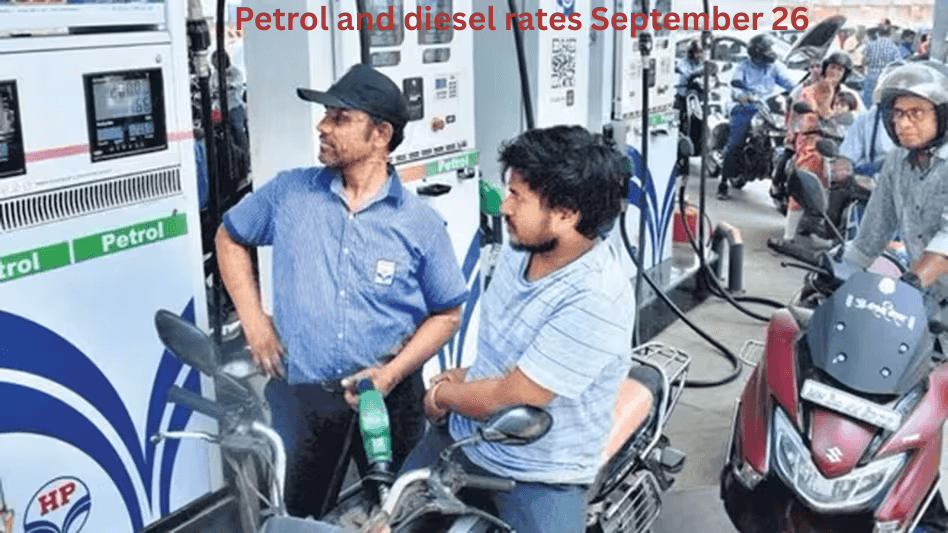Petrol, Diesel Fresh Prices Announced: Latest Fuel Rates for September 26 Across Indian Cities
Check petrol and diesel prices for September 26, 2025, across major Indian cities including Delhi, Mumbai, Bengaluru, Chennai, and Kolkata. Stay updated on daily fuel price trends and factors affecting oil rates.
Petrol, Diesel Fresh Prices Announced: Check Rates in Your City on September 26
Petrol, Diesel Fresh Prices Announced: Latest Fuel Rates
Fuel prices remain one of the most closely tracked economic updates for Indian households, transporters, and businesses. Since India imports a major share of its crude oil, global market fluctuations and government taxation policies directly impact the daily retail petrol and diesel rates. On September 26, 2025, oil marketing companies (OMCs) such as Indian Oil Corporation (IOC),
Bharat Petroleum (BPCL), and Hindustan Petroleum (HPCL) released the fresh fuel prices for different states and cities.
Let’s take a detailed look at the latest petrol and diesel prices, the factors driving these rates, and how they impact common citizens.
Petrol and Diesel Prices in Metro Cities (September 26, 2025)
Fuel prices differ from one city to another because of state-wise Value Added Tax (VAT), transportation costs, and other local levies. Here’s an update on the September 26 fuel prices in top metros:
Delhi: Petrol ₹97.45 per litre, Diesel ₹90.10 per litre
Mumbai: Petrol ₹106.48 per litre, Diesel ₹92.69 per litre
Chennai: Petrol ₹102.34 per litre, Diesel ₹94.22 per litre
Kolkata: Petrol ₹103.12 per litre, Diesel ₹91.88 per litre
Bengaluru: Petrol ₹101.22 per litre, Diesel ₹92.02 per litre
(Prices may vary slightly depending on specific areas and outlets.)
City-Wise Fuel Prices Across India
Apart from the metros, several tier-2 and tier-3 cities also see fluctuations in daily rates. For instance:
Hyderabad: Petrol ₹104.05, Diesel ₹95.08
Pune: Petrol ₹105.12, Diesel ₹92.89
Jaipur: Petrol ₹104.42, Diesel ₹95.22
Lucknow: Petrol ₹96.20, Diesel ₹89.80
Patna: Petrol ₹108.48, Diesel ₹94.10
Understanding these differences helps both individual consumers and logistics companies plan expenses against their fuel usage.
Why Do Petrol and Diesel Prices Fluctuate Daily?
Petrol and diesel rates in India have been linked to global crude oil prices since June 2017, when the government introduced the dynamic fuel pricing system.
Under this system, fuel prices are revised every morning at 6 AM.
Factors that typically affect these daily changes include:
Global Crude Oil Rates: A rise in Brent crude or WTI prices often leads to higher fuel prices in India.
Exchange Rate Fluctuations: Since crude oil is imported in US dollars, the rupee-dollar equation plays a major role.
Central and State Taxes: Excise duty and VAT together form a significant portion of fuel costs.
Transportation Costs: Moving oil from refineries to retail pumps adds local logistical charges.
Geopolitical Situations: Events such as wars, shipping disruptions, or OPEC+ output decisions push volatility.
Impact of September 26 Fuel Prices on Citizens
Fuel prices have a direct and indirect impact on inflation in India. For common citizens:
Household Budgets: Families dependent on two-wheelers and cars feel the immediate burden of higher spending.
Public Transportation: Autos, taxis, and buses often pass on fuel hikes to passengers.
Food and Essentials: Transportation costs of vegetables, fruits, and packaged goods increase, leading to higher retail prices.
Industrial Costs: Sectors like cement, construction, and logistics see a surge in operating costs when diesel rises.
Thus, daily fluctuations in fuel rates are more than just pump readings—they impact the overall economy.
How to Check Petrol and Diesel Prices in Your City
Consumers can easily track daily updates using the following methods:
SMS Service: Indian Oil, BPCL, and HPCL allow fuel price checks via SMS.
Official Apps: “IndianOil ONE” app, BPCL’s “SmartDrive,” and HPCL’s “MyHPCL” provide real-time updates.
Official Websites: Fuel rates are published daily by the oil marketing companies.
Third-Party Apps: Several mobile apps also consolidate daily fuel prices for convenience.
For example:
In Delhi, IOC customers can send RSP <dealer code> to 9224992249 to get the fuel price for their area.
Government Measures and Relief Expectations
High fuel prices often raise debates over government policy interventions.
While excise duty cuts bring temporary relief, state governments also adjust VAT depending on fiscal needs.
The current global scenario, with OPEC+ production strategies and Indian rupee volatility, suggests prices could see both short-term spikes and dips. Policy watchers expect that during festive seasons or election periods, governments may introduce duty cuts to ease consumer concerns.
Saving Tips for Consumers Amidst Rising Fuel Prices
Even though prices are beyond individual control, smart fuel management can reduce monthly spending:
Carpooling: Sharing rides with colleagues or neighbors saves costs.
Public Transit: Metro and bus systems offer cheaper alternatives compared to private vehicles.
Fuel Efficient Driving: Maintaining steady speeds, correct tyre pressure, and avoiding overloading improves mileage.
Digital Wallet Rewards: Paying through UPI apps and credit cards often gives cashback on fuel spending.
Outlook
As of September 26, 2025, petrol and diesel prices across India remain steady in most regions, with minor changes depending on crude oil dynamics.
Consumers can expect some volatility in the coming months due to global uncertainty, particularly in Middle East oil shipping channels and crude production levels.
